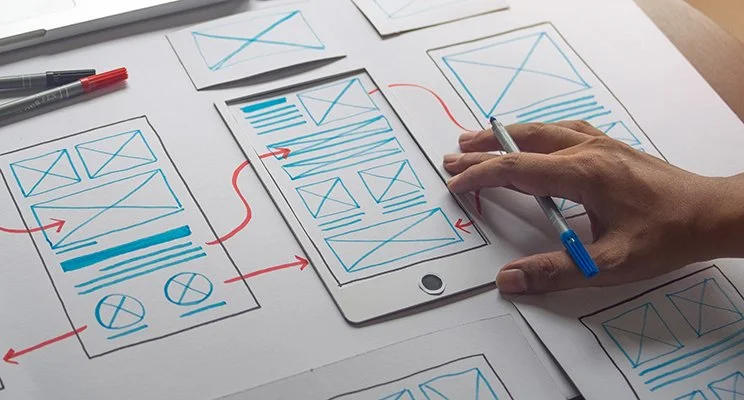7 Questions to Ask Yourself Before Any Website Project
If you're reading this, then you already know that an effective website is a cornerstone of any successful modern business.
The key is in that word effective — there are a ton of moving parts working together to create what we consider a "good" website these days. To stand out from the competition, your site needs to be readily found via search engines, easy to navigate, well designed and should feature unique, compelling content that reflects the vision of your organization or team. (Oh, and it should work pretty much perfectly across various screens and devices.)
To add even more fun to the mix, the technology underlying website development and search engines is constantly evolving, so keeping up can be a challenge.
One of the biggest decisions I encourage clients to confront early in any website project is whether they can realistically expect to strategize, create and maintain content themselves over the long term.
Fortunately, there are a few quick questions that any entrepreneur or leader can ask themselves to set their next project up for success — whether it's a new website or a redesign, for any budget or business type:
1. How Does a Website Fit Into My Business Plan or Marketing Strategy?
Today, there's an entire ecosystem of tools and apps available to create websites. And while their easy accessibility may be tempting, rushing the launch of a new or updated web presence can lead to costly errors and rework, frustrating user experiences or blemishes to your brand or reputation.
Imagine that you're planning a vacation, or building your dream house. You wouldn't start without having a basic map or blueprint, right? Your business plan — even if it's a working draft — sets the vision for the future, and a website is only one building block supporting that future. Knowing where your site fits into the overall scheme helps avoid the bad restaurants on vacation, or walking into your dream house to discover there's no bathroom!
A simple test is to list the realistic, measurable goals and metrics that you expect a website to influence for your business or team. If it's hard to tell whether brand awareness via pageviews, boosting lead generation or reducing customer service calls should be the priority, then chances are your strategic planning would benefit from a closer look.
2. Do I Have a Brand to Rely On as a Guiding Force?
At some point, you (or someone on your team) will be staring at a blank screen to come up with the right words or visuals to help your identity, products or services stand out from the competition. Ideally, when that moment comes, the content won't be created completely from scratch — instead, there's a core brand, mission or market niche to lean on that helps the writing and design flow naturally.
Think about your company's brand, about all the pieces that combine to differentiate it among the world of options available to potential customers: Its logo or wordmark. The colors you associate with it. Fonts and typefaces that match its character. The specific language used in your planning and marketing. Each and every one of these elements should be woven consistently into the fabric of your website. They make up your creative DNA.
Is part of your identity that the company is "family-owned?" So are 27% of the roughly 33 million small businesses in the United States. To set yourself apart, your branding will need to go deeper, by showing and telling what's different about your family and how it conducts business. Your website's text, visuals and value proposition should all reinforce that core theme and idea — every page, every message, every time.
3. How Much Budget Can I Commit to 12 Months of Website Production?
A budget is a reflection of priorities. Once you've decided that a new or improved website is a priority, the next question is just how much you're prepared to allocate to the project.
The right formula depends on a number of factors, but one simple truth is that — like many other aspects supporting a business — the initial setup and upfront work will make the first year more financially costly, with subsequent years driven more by maintenance, upgrades and accounting for growth.
A budget is a reflection of priorities.
The essential, first-time monetary expenses tied to launching a website are in securing a domain (your unique .com or .org, for example) and lining up hosting services (reserving space for the photos and other files that make up your site). In some cases, domain and hosting costs are bundled together as a package — CNET provides a good breakdown of hosting options here.
I should note that these don't include investments of time and resources in supporting services like email, content creation or advertising. The important thing to realize is that a website is a permanent fixture of your business. Like any physical property, it requires regular care, investment and technological currency to provide significant returns.
4. Will This Be an Ecommerce Site?
You can see it clear as day: A well-designed, customer-centric website that serves as fertile ground for your ideas and products to flourish.
To make your vision a reality, the deceptively simple question of "Will I sell stuff?" has real bearing on website strategy and planning. Your ecommerce needs, like product cataloging, shopping carts, payments and customer service, will differ greatly from a site covering core features and benefits — and they will be developed in parallel with other content during the ramp-up to launch.
Ever hear the old carpenter's expression, "Measure twice, cut once?" In the long run, your ecommerce site will benefit from added care, thoughtfulness and attention to detail during its initial creation. While platforms like Shopify, Wordpress and WooCommerce do offer out-of-the-box themes and tools to help you get up and running, the process of building, customizing and testing an online store that matches your brand will (rightly) take time.
A detailed walkthrough can be found here, via Forbes.
Launching a site 30 days later to make it 30% better is often a worthwhile tradeoff.
5. Does My Content Reflect My Business Model?
Imagine three types of businesses: A local pizza shop, a landscaping service and a music teacher. Even with similar goals and metrics, their website content will vary widely.
For the pizza shop, the site is likely very transactional: People know pizza, people love pizza. The content will heavily promote their menu, locations, ordering info and latest specials.
Our landscaper's website content will be more informational: While we all appreciate a beautiful lawn, we're hiring someone to do the work for us. The site needs to prioritize details about mowing, fertilizing and other services to help attract new customer leads.
Finally, our music teacher's site should be inspirational: Learning to play an instrument is an intensely personal decision, requiring hundreds of hours of practice and other investments. The right teacher makes all the difference, so you can imagine the storytelling would be warm, engaging and personal.
These are basic examples, but hopefully illustrate the importance of your site's content — whether visibly through words and pictures, or in its search engine optimization (SEO) settings hidden from view — flowing directly from your business model and brand.
6. Will I Maintain This Website Myself?
One of the biggest decisions I encourage clients to confront early in any website project is whether they can realistically expect to strategize, create and maintain content themselves over the long term.
After all, the overwhelming majority of business owners don't specialize in writing, marketing or web design and their most valuable resource — time — is often consumed with day-to-day leadership in their field of expertise. All the same, some entrepreneurs prefer a more hands-on approach to a vital marketing asset like website development.
If you plan to create and manage your own web property, there are two important steps that should guide your process. The first is choosing a content management system (CMS) that works best for your needs. A list of the most popular options, along with various pros and cons to consider, can be found here.
Second is to plan for growth: As your business expands, so too will the amount of time needed for content creation and supporting marketing like social media and email campaigns.
On the other hand, many small businesses and nonprofits partner with trusted, reliable freelance experts for website creation and maintenance plans based on their needs and budgets. Like this guy.
7. What Are the "Must-Haves" for Going Live, and What Can Wait?
If everything is a priority, then nothing is.
As you build, inventory and evaluate the various sections and pages of your website, you should be able to identify the "want to haves" versus the "need to haves" for your publication date. Let's say you're debuting a redesigned event website: The home page, event date and RSVP page would be the priorities for launching; a ten-year retrospective photo gallery or parking information could likely be scheduled as post-launch additions if you're crunched for time.
In many cases, a web property is only one element of a much larger rollout with supporting print, social media or other marketing — the flexibility to adjust then becomes even more important, when the lists of high, medium and low priorities can quickly get burdensome.
Ultimately, that real-time editing ability is one of the main advantages of websites compared to print advertising, direct mail and email. It's not to suggest that you should allow or expect important pieces to fall behind — only that the smart planning is to recognize safety nets in the production schedule and leverage them when needed.
About Me
I’m a freelance partner for small business, higher education and nonprofits with more than 20 years of award-winning experience in marketing, writing, design and strategy. Proud graduate of The University of Toledo and Michigan State University.





